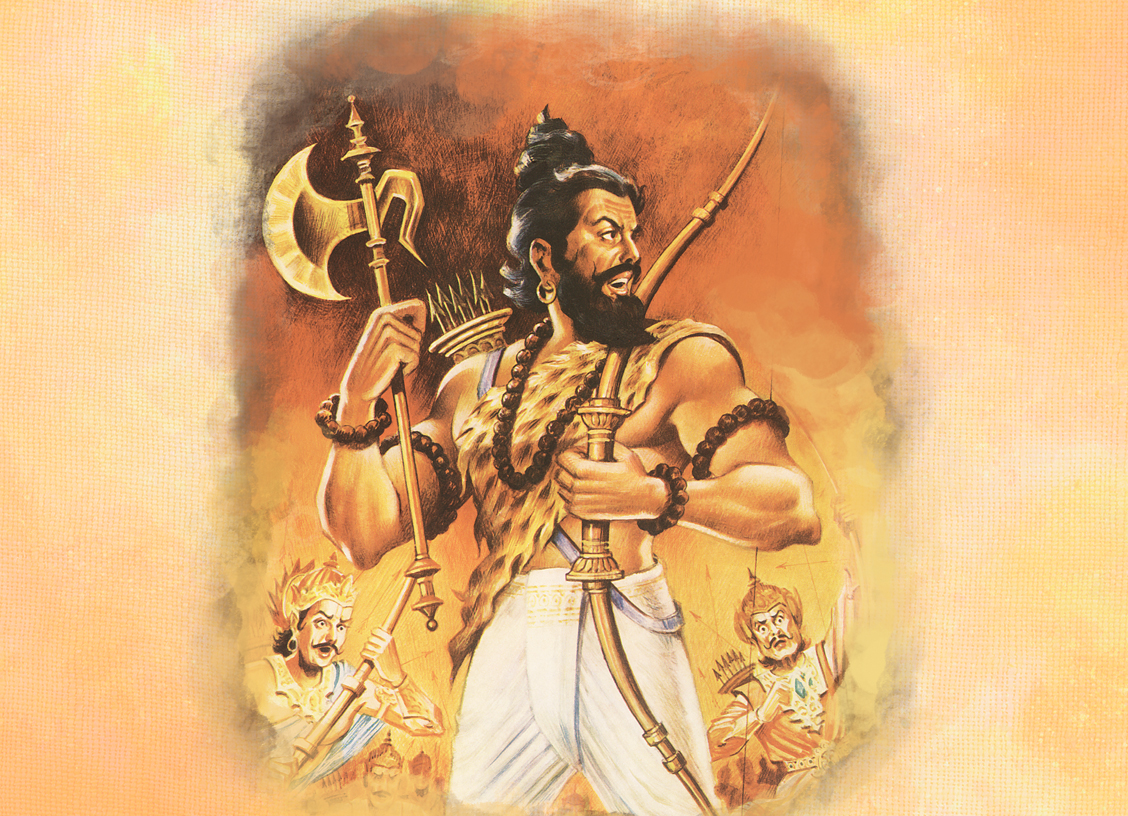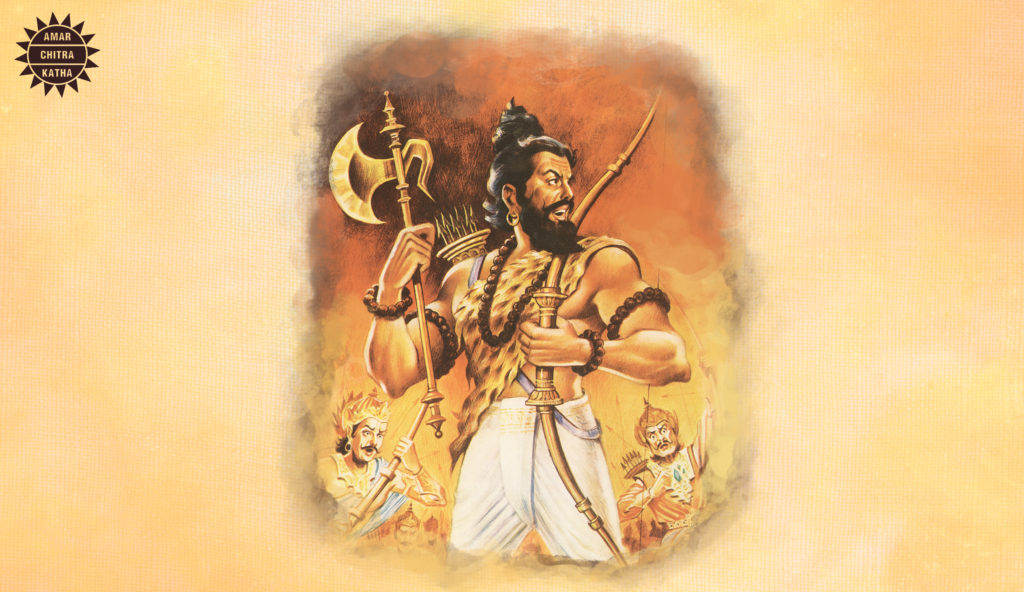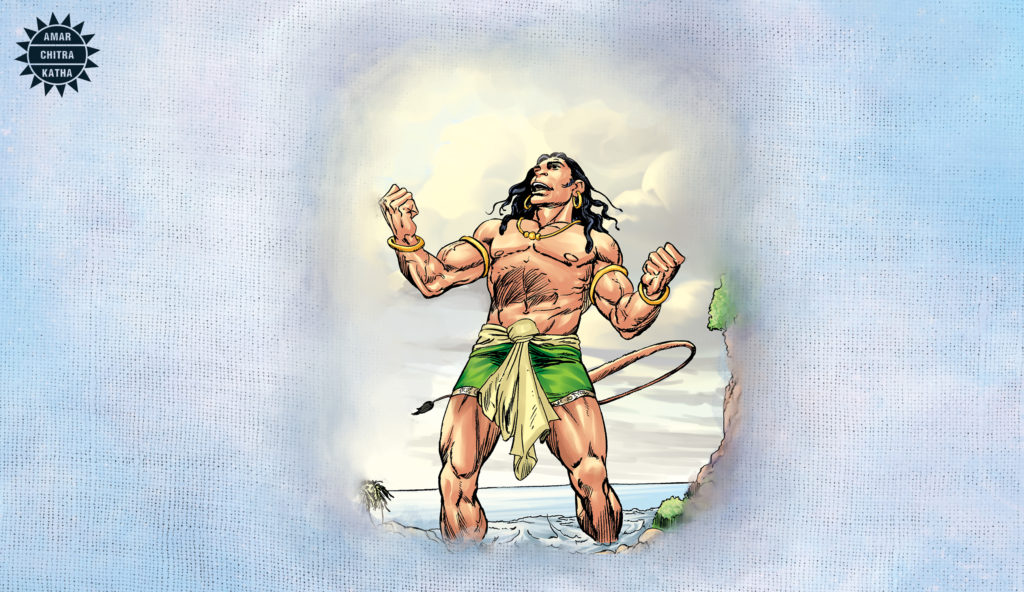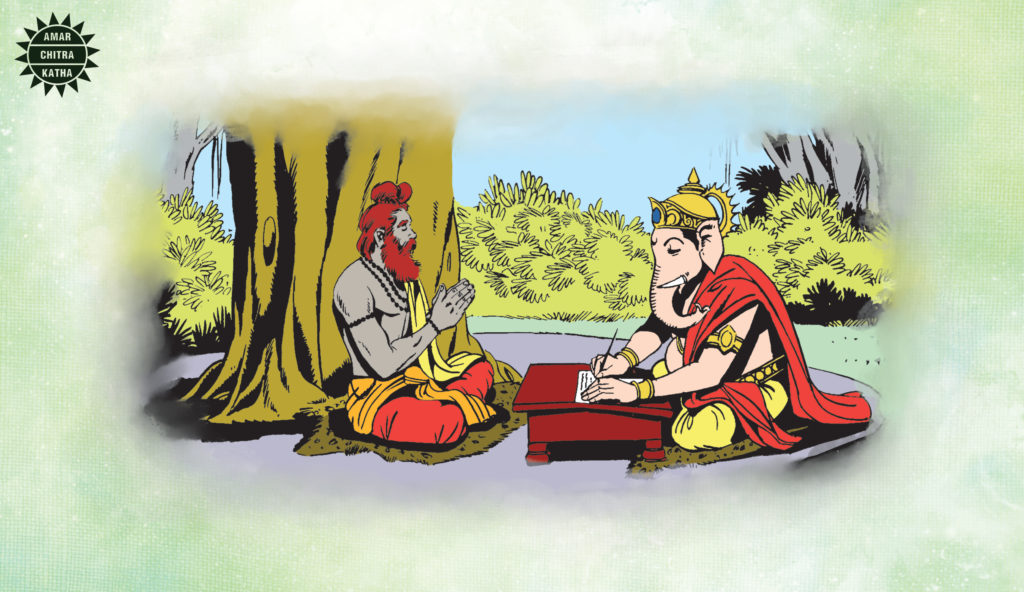Chiranjeevi: The Immortals
- January 31, 2024


Chiranjeevi: The Immortals
- January 31, 2024
By Vidhi Kubadia
In Hinduism, the cycle of life and death is endless until one attains moksha (liberation from birth). However, there are some people who do not follow the same cycle. These are the Chiranjeevis. The Sanskrit word ‘chiranjeevi’ means immortal. Different texts mention either seven or eight such beings. This article explores how all of them attained immortality.

Parashurama is the sixth reincarnation of Vishnu. After his family was mistreated by Kshatriyas, he made it his mission to rid the earth of them. Trained by Shiva himself, Parashurama was brave, knowledgeable and devoted. Shiva gave him his axe, the Parashu, which led to him being called Parusharama, meaning ‘Rama with an axe’. Parashurama was a skilled teacher who taught Bheeshma, Drona and Karna. In fact, it is said that he was granted immortality by Shiva in order to train Kalki, the last reincarnation of Vishnu. He has met both Rama and Krishna, making him one of the few Dashavatars who has interacted with the others.
To receive more such stories in your Inbox & WhatsApp, Please share your Email and Mobile number.
Ashwatthama, the son of Drona, was born with a powerful gem on his forehead. This gem eliminated hunger, thirst, disease, and fear of any weapons, rakshasas, nagas and even gods, making Ashwatthama invincible. During the Kurukshetra War, Ashwatthama’s father, Drona, and his friend, Duryodhana, were killed. Full of rage and grief, he went to seek revenge on the Pandavas. In the darkness, believing Draupadi’s five sons to be the Pandavas, he killed them instead and as a result, a furious battle ensued. He then tried to kill the unborn child of Uttara (Abhimanyu’s wife and Arjuna’s daughter-in-law), to end the Pandava lineage. However, before that could happen, Krishna took away his gem, condemning him to a life of endless suffering. It is believed that he still wanders the earth, filled with sickness and misery, his immortality being a curse instead of a boon.
Vibhishana was Ravana’s brother and an asura. However, during the war, he defected to Rama’s side because of his righteousness. Some legends say that after the war, Rama granted him immortality to oversee the asuras and guide them along the path of righteousness. Others believe that it was Brahma who granted him immortality. When Brahma allegedly appeared in front of Vibhishana to grant him a boon, the latter asked for his mind to never stray from his conscience and that he always stay truthful. Impressed by this, Brahma bestowed upon him the gift of immortality.
Mahabali was an asura king who captured the three worlds, defeating the devas. When they prayed to Vishnu, he took the form of a poor dwarf, Vamana, and asked the charitable king for three pieces of land measured by his stride. Mahabali agreed and suddenly, Vamana grew to an enormous size, covering the earth and heaven with his first two steps. When the humble Mahabali offered his own head for the third step, Vishnu, impressed by his gesture, crowned him the king of the underworld. Mahabali asked to be able to visit his subjects once every year, and so Vishnu made him immortal. Legends say that he might become the next king of heaven, taking Indra’s place. To this day, the festival of Onam in Kerala is a celebration of his annual return.

Hanuman is the son of the wind god, Vayu, and his tales are recounted in the Ramayana, the Mahabharata and the Puranas. He is known for his devotion to Rama. According to some, when Rama was about to offer himself to River Sarayu, his last instruction was that Hanuman stay on earth till the end of this era to spread the Ramayana. This made him immortal. Other stories say that he was struck by Indra for trying to eat the sun as a child, and when revived, granted immortality by the devas. Some legends also speculate that he was granted immortality by Sita as a token of gratitude, and for his devotion.
In the Mahabharata, Kripa was Drona’s brother-in-law and Ashwatthama’s uncle. He taught the Pandavas and the Kauravas, when they were growing up, and was considered a great teacher by all the princes. Unlike Drona, he was a fair and impartial guru, in whose eyes all his students were the same. Due to this nature, he was given the title ‘Acharya’ meaning ‘teacher’ or ‘guru’, and blessed with immortality.

Born as Krishna Dwaipayana, Veda Vyasa (literally translated as ‘splitter of the Vedas’) is a sage and scholar who compiled the Vedas into four books. He is also known for writing the Mahabharata, the Upanishads, and the Puranas, all of which are important scriptures in Hinduism. Guru Purnima, a festival dedicated to honour teachers, is also known as Vyasa Purnima because it falls on his birthday. Some legends say that Vyasa was granted immortality so he could share his vast knowledge with the world. Other legends say that he was born an adult and has been immortal since.
Some sources believe that Markandeya is the eighth Chiranjeevi. When his parents prayed to Shiva for a son, they were given the option of either having a pious child who would not live long, or a wicked child who would enjoy a long life. They chose the former and Markendeya was born — the ideal son, who destined to die at sixteen. He grew up to be a staunch devotee of Shiva, performing severe austerities and worshipping the Lingam. When the time came for Markandeya’s death, his devotion to Shiva protected him from dying. When Yama came to take his life, Shiva emerged from the Lingam, defeating Yama, and reviving Markandeya. He was then made immortal, remaining sixteen forever.
To receive more such stories in your Inbox & WhatsApp, Please share your Email and Mobile number.

Comic of The Month
The Naval Journey of India Book I
This book is the first of a three-book series that takes a deep and detailed look at India's Naval History and a deep insight into the lives of our men and women in white. But any series on the Indian Navy has to start at the very beginning - exploring India's celebrated maritime history. Join our little hero, Bharat, and his grandfather, Commodore Sagar, as they sail into the deep blue waters of time. Book I of The Naval Journey of India takes a sweeping look at India's maritime endeavours, how the seas impacted us over millennia and how the oceans made us who we are.